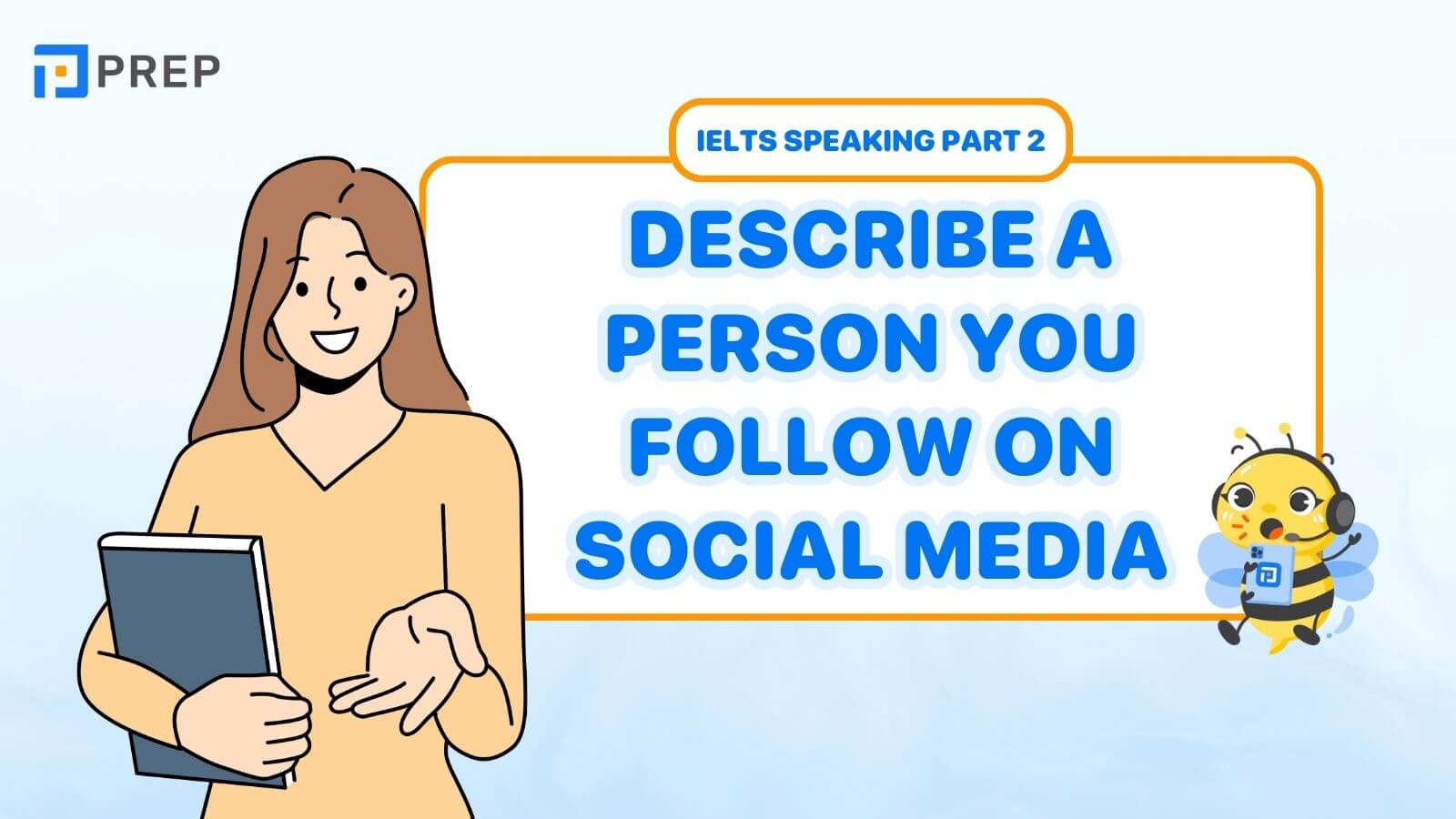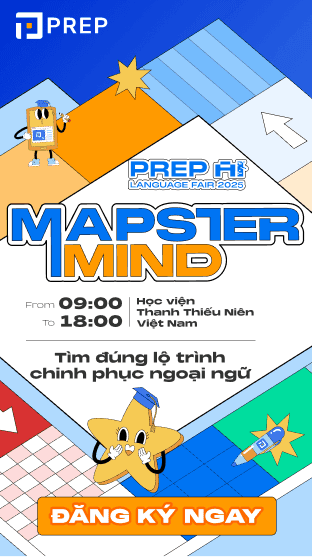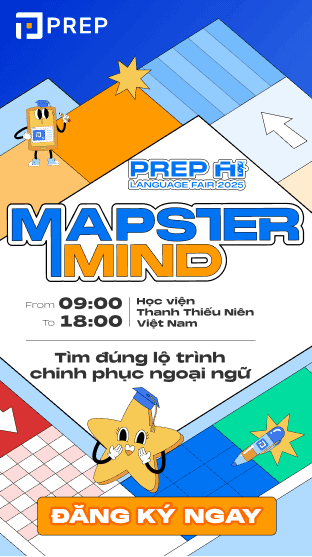Bài mẫu Speaking Part 2, 3: Describe a person you follow on social media
Đề bài Describe a person you follow on social media thuộc chủ đề “Describe a person”. Vậy nên, để trả lời cho câu hỏi này, bạn có thể lựa chọn một số đối tượng quen thuộc có thể áp dụng như: bạn bè, gia đình hoặc một người nào đó bạn ngưỡng mộ. Ngoài ra, với mong muốn giúp học viên học luyện thi hiệu quả, dưới đây là bài mẫu chủ đề Describe a person you follow on social media được viết bởi thầy Nhật Phạm. Hãy cùng tham khảo nhé!
[caption id="attachment_11730" align="aligncenter" width="900"] Bài mẫu IELTS Speaking Part 2+3 chủ đề “Describe a person you follow on social media”[/caption]
Bài mẫu IELTS Speaking Part 2+3 chủ đề “Describe a person you follow on social media”[/caption]
I. Bài mẫu IELTS Speaking Part 2 chủ đề “Describe a person you follow on social media”
Describe a person you follow on social media là một trong những chủ đề quan trọng speaking ielts 7.0+ . Chủ đề này nên có trong lộ trình học ielts của bạn nhé
1. Đề bài Describe a person you follow on social media
Describe a person you follow on social media
[caption id="attachment_11685" align="aligncenter" width="1640"] Describe a person you follow on social media[/caption]
Describe a person you follow on social media[/caption]
2. Dàn bài Part 2
2.1. Ý tưởng bài mẫu (tiếng Việt)
| Thông tin | Miêu tả |
|
|
| Câu chuyện liên quan | Kết luận |
|
|
2.2. Take note trong 1 phút (tiếng Anh)
| Setting (Who, How, When, Where) | How you know them |
|
|
| Their social media content | Feelings & Conclusion |
|
|
3. Bài mẫu chủ đề Describe a person you follow on social media
Cùng nghe Podcast bài mẫu IELTS Speaking Part 2 - Describe a person you follow on social media:
I don’t tend to follow a lot of people on social media, but one who I could remember is Nick Mullen, an American comic and actor.
I first knew him from YouTube clips of his stand-up comedy work, where he came off as a frequent face of the New York comedy scene. And through YouTube, I also learned of his podcast and social media account on Twitter. It turns out that Nick has an even larger following on the Internet. Fortunately, Nick doesn’t separate his Twitter presence into a personal account and public account like so many people, so it’s easier to catch up with his thoughts at any time.
Nick’s posts on his Twitter feed consist almost entirely of jokes, save for the few posts where he advertises his tour dates. The jokes are exhilarating for being a combination of satire, pop culture knowledge and Internet culture. However, they might be off-putting to people who haven’t been on the Internet for a long time, as these people will have a harder time seeing what’s funny in Nick’s jokes. Still, the posts are apolitical and without any severity, which might explain why so many people follow Nick.
All in all, Nick’s Twitter is a source of comedic relief on the virtual space. I’d definitely say that it’s a refreshing breeze of wind on social media, which is frequently flooded with depressing and humorless information.
- Comic (n.): danh hài
- Stand-up comedy (n.): hài độc thoại
- Come off as (v.): có vẻ là
- Following (n.): lượng người hâm mộ
- Save for (prep.): ngoại trừ (tương tự “except for”)
- Satire (n.): trào phúng
- Pop culture (n.): văn hóa đại chúng
- Off-putting (adj.): gây phản cảm
- Apolitical (adj.): không mang tính chính trị
- Comedic relief (n.): sự giải tỏa bằng hài hước
Tham khảo thêm bài mẫu IELTS Speaking Part 2 + 3:
II. Câu trả lời mẫu IELTS Speaking Part 3 chủ đề: Social media
Cùng nghe Podcast bài mẫu IELTS Speaking Part 3 - Social media:
1. Do you think older people and younger people will use the same kind of social media software?
I think this is true, but only to a certain extent. Older people and younger people will use the same kind of social networking apps to communicate with each other, but the youth will be using different software to talk among themselves. This is already the case with people I know. Friends my age would use a certain Vietnamese app to keep in touch with their older relatives and family members, but when they need to catch up with other young adults, Messenger, which is an international app, tends to be the place.
- Keep in touch (v.): giữ liên hệ
- Catch up (v.): cập nhật thông tin
2. Do older people spend much time on social media?
I don’t think so, because they belong to a different time, before social media was a thing. They learned to pick up actual hobbies and interests, and so their use of time is better. However, with the situation being almost everybody owning a presence on the Internet, I think there are always exceptions to what I said earlier. Social media can be very tempting to anybody regardless of age.
- Own (v.): sở hữu
- Exception (n.): ngoại lệ
- Tempting (adj.): cám dỗ, thu hút
3. What is the difference between mass media and social media?
I think the main difference between them lies in the diversity of contributors. On mass media, only the reporters may provide the news, and even then the information has to be edited and cut up before it’s displayed, so what’s presented is far from being the entire picture.
Meanwhile, on social media, anybody can be a source of information, so there is a more diverse interpretation of events, and as a result, the truth is usually somewhere in between. However, this is also why social media news is more prone to having false claims. I’m putting this out there anyway because I’m quite partial to social media and I haven’t actively watched TV for years.
- Lie in (v.): nằm trong
- Interpretation (n.): sự diễn giải
- Prone to sth (adj.): dễ làm điều gì đó
- Partial to sth (adj.): thiên vị điều gì đó
III. Lời kết
Trên đây là toàn bộ IELTS Speaking Part 2 Sample chủ đề Describe a person you follow on social media. Hay đăng ký ngay cho mình 1 khóa học ielts tại prepedu.com và cùng các thầy cô chinh phục Ielts Speaking bạn nhé !

Chào bạn! Mình là Hiền Hoàng, hiện đang đảm nhận vai trò quản trị nội dung sản phẩm tại Blog của website prepedu.com.
Với hơn 5 năm tự học các ngoại ngữ như tiếng Anh, tiếng Trung và ôn luyện một số kỳ thi IELTS, TOEIC, HSK, mình đã tự đúc rút được nhiều kinh nghiệm để hỗ trợ hàng nghìn người đang gặp khó khăn trong việc học ngoại ngữ. Hy vọng rằng những chia sẻ phía trên sẽ giúp ích cho bạn trong quá trình tự ôn luyện thi hiệu quả tại nhà!
Bình luận
Nội dung premium
Xem tất cảLộ trình cá nhân hoá
Có thể bạn quan tâm
Kết nối với Prep

MSDN: 0109817671.
Địa chỉ liên hệ: Tòa nhà Vinaconex, 34 Láng Hạ, phường Láng, TP Hà Nội.
Trung tâm CSKH tại HN: Lô 21 C2 Khu đô thị Nam Trung Yên, phường Yên Hòa, TP Hà Nội.
Trung tâm CSKH tại HCM: 288 Pasteur, Phường Xuân Hòa, TP Hồ Chí Minh
Trụ sở Công ty: Số nhà 20, ngách 234/35 đường Hoàng Quốc Việt, phường Nghĩa Đô, TP Hà Nội.
Phòng luyện ảo - Trải nghiệm thực tế - Công nghệ hàng đầu.
Hotline: 0931 42 8899.
Trụ sở Công ty: Số nhà 20, ngách 234/35 đường Hoàng Quốc Việt, phường Nghĩa Đô, TP Hà Nội.
Giấy chứng nhận hoạt động đào tạo, bồi dưỡng số 1309/QĐ-SGDĐT ngày 31 tháng 07 năm 2023 do Sở Giáo dục và Đào tạo Hà Nội cấp.

























